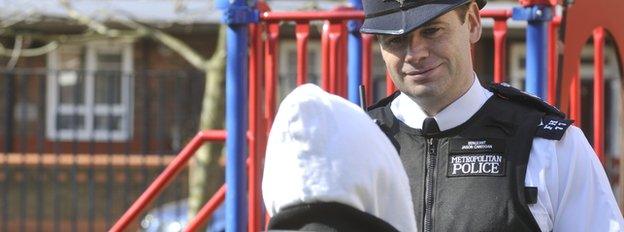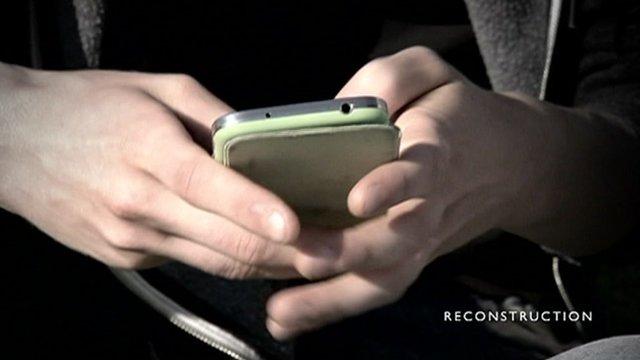Sexting boy's naked selfie recorded as crime by police
- Published
- comments

A boy who sent a naked photograph of himself to a girl at school has had the crime of making and distributing indecent images recorded against him by police, the BBC has learnt.
The boy, aged 14, who was not arrested or charged, could have his name stored on a police database for 10 years.
The information could also be disclosed to future employers, his mother said.
Police said three children were named in a crime report, but it was not in the public interest to prosecute.
The Criminal Bar Association said the case highlighted the dangers of needlessly criminalising children.
The schoolboy, who lives in the north of England, told BBC Radio 4's Today Programme he took the naked photo of himself in his own bedroom.
He then sent it to a girl from his school using Snapchat - an app which deletes direct messages within 10 seconds.
However, before the image disappeared, the girl saved it on her own phone and it was then sent to other pupils at the school.
'Humiliated'
The matter was brought to the attention of a police officer based at the school and it has now been officially recorded as a crime.
However, his mother was told her son's details - along with those of the girl involved and another teenager - had been added to a police intelligence database and could be stored for at least 10 years.
She said the school police officer said the incident could be flagged up in a DBS check (formerly CRB) if her son ever wanted to get a certain jobs - including one working with children.
She told the Today programme her son had been "humiliated", saying he was "at best naive" and at worst was just being "a teenager".
Many children at the school now take part in so-called "sexting" as a form of "flirting", she said.
The boy, who has asked to remain anonymous, said he felt "embarrassed and a bit intimidated" by the way the incident had been dealt with by police and his school.
He said he knew some people at the school still had the image.
Asked about the consequences of the incident, he added: "It is just annoying really.
"Something that I did when I was 14 that could reflect badly in the future."

Analysis, BBC home affairs correspondent Danny Shaw

The key issue at the heart of this case is police discretion.
Should police have discretion to deal informally with sexual experimentation, naivety and foolishness, rather than having to log the details on a central database?
The consequences that flow from that process may be far-reaching. A report of a crime stays on file for 100 years.
The names of those allegedly involved - even though not arrested let alone charged or convicted - are stored on an intelligence system, the Police National Database, for at least 10 years for sex offences.
And the details of what happened may be disclosed to future employers.
At present, it seems police have little discretion. Once a school has informed officers about an incident like this the guidelines say it must be recorded.
No-one would question the need to do that in a case where children are in need of protection or at risk of sexual exploitation. But is it necessary when it's a teenage prank?

'Important questions'
The school said there was no aggression or intimidation during his questioning and that the boy admitted what he had done straight away.
It said all students are taught about the dangers of sexting in assemblies and in class.
The boy's mother said police had only recently started filing crime reports about similar incidents, something her son says he was not aware of.
However, the school said all students were informed about the recent change in policy.
The statement from the investigating police force said: "At no time was any young person arrested or interviewed under caution in a formal police interview.
"The report of crime has been filed with the three children involved named and given an outcome of not in the public interest to prosecute."
BBC Home affairs correspondent Danny Shaw said the case raises "important questions about the role of the police in dealing with disputes arising from social media".
Meanwhile, Olivia Pinkney, Sussex Police's deputy chief constable and the National Police Chief Council's lead on children and young people, said if a school chose to take an incident to the police, then officers must record the crime.
She said the boy would be able to appeal against the decision before it was disclosed to future employers, saying she did not believe it would ever "be disclosed".
The Home Office said it was "the responsibility of individual police forces" to accurately record crimes.
- Published15 June 2015

- Published11 May 2015

- Published26 June 2014
